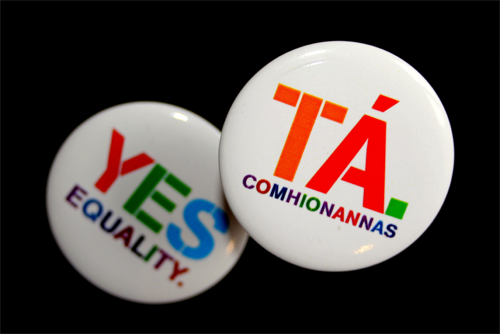On 22 May 2015 the Irish people went to the polls to vote whether to add a clause to their constitution which would extend the right to civil marriage to couples of the same sex. The referendum carried with a resounding result.
All but one constituency in the Republic voted in favour of adding this clause, and thereby, extending to gay couples the right to the same civil union which straight couples have enjoyed since the constitution came into force in 1937. The result did not reflect the usual urban-rural divide displayed in many recent referenda and constituencies characterised by working-class communities, who have been perceived as being traditional, if not conservative, in their thinking, often returned the largest margins in favour of the proposition.
The result also crossed all age groups. It was not a matter of older people versus younger people but represented a common ground where all levels of the age spectrum came together. In fact, the turn out for the referendum was marked by a large number of young people, a group who have often been difficult to engage in political decision-making.
The significance of this event is that, while many countries have legislated for full, gay marriage, this is the first time that the question was put to the people for their approval and concurrence. And the people responded in the clearest voice, many of them returning home from abroad, specifically to vote.
I am so proud to be an Irish citizen. I am so proud that this small country, often wrongly perceived as a conservative, if not backward, land in the grips of the Catholic Church, has shown that it is a modern, open-minded, and Christian country, in the purest, non-religious sense of that word.
Many on the defeated ‘No’ side are claiming that the people’s decision was a result of American dollars being pumped into the ‘Yes’ campaign. As it turns out, the campaign did receive healthy contributions from a human rights funding agency, which happens to fund many like projects around the world.
But regardless of campaign contributions, do those that believe their defeat is due to this money forget that when the subject of extending marriage to gay couples was raised during the Constitutional convention and polls were taken at the time to ‘test the waters’, that the majority of Irish people were in favour? And this was long before a referendum was put forward or any campaigning began? And are they suggesting that the only way the Irish people could vote against their view is to have been bought?
And so what if money came from abroad to assist in the campaign? No one seems to object to the money that large American companies pump into the Irish economy each year which has a much greater impact on Irish culture in the form of Americanisation? And what if the money came from a ‘gay-specific’ group? There are never many objections when people are clamouring for the so-called ‘pink euro’; so what if we want to spend some of our ‘disposable income’ on ourselves?
But, that’s really more red-herrings to avoid the acceptance that an inclusive and egalitarian Ireland is the kind of Ireland the majority of Irish people would like to live in. I hope that this decision will also have some impact on those Irish who are so quick to criticise their own country and like to view it as backward and out of touch, and that they will see what a generous and open country they actually inhabit.
On this point, I feel that our former President, Mary McAleese, put it best when she pointed out that even if all the gay people in Ireland voted in favour of the referendum, they could not carry the vote on their own. They needed the help of their straight parents, siblings, cousins, neighbours, colleagues, friends, and yes, strangers.
I believe this result is an example of the Irish people shrugging off the Victorian morals they had espoused in recent centuries in order to survive, and returning to embrace their native values. Traditional Irish culture revolved around family and clan. The ‘traditional’ Irish family included fosterage and other non-blood members and often strayed far from our narrow, modern concept of a nuclear family. And as an extension of this ‘familial’ concept, traditional Irish culture bore a mandate for extending welcome and kindness to strangers.
And I, for one, am grateful this aspect of the native culture has not been extinguished as is apparent from the results of the Marriage Equality referendum vote.
